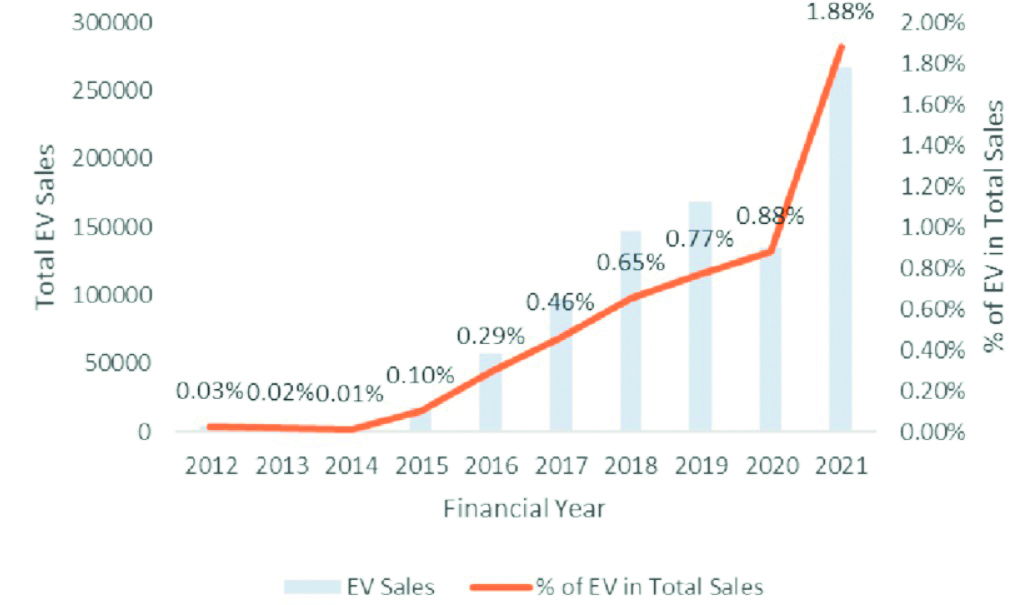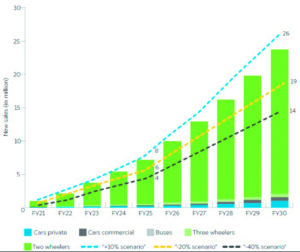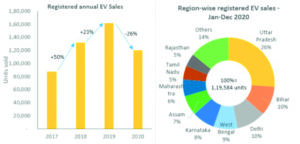
India is likely to see 1 crore Electric Vehicle (EV) sales a year and the segment is expected to generate about 5 crore jobs by 2030, Union minister Nitin Gadkari said.
Addressing the 19th EV EXPO 2023, Gadkari, “As per the Vahan database, 34.54 lakh EVs are already registered in India.” The Union Road Transport and Highways minister asserted that India has the potential to become number 1 EV maker in the world and the government is committed to making India a self-reliant country in clean energy production and mass application.

Gadkari said the government has also permitted retrofitting of existing polluting vehicles into hybrid and fully EVs. The regulations have been finalised and technology demonstrations done successfully, he added.
He said the government intends to shift public transport and logistics to EVs. The regulations have been finalised and technology demonstrations done successfully, he added. Electric vehicles have been gaining popularity worldwide as people become increasingly aware of the adverse effects of fossil fuel-powered vehicles on the environment.
In India, the rise of electric vehicles has been slower than in some other countries, but there are indications that this trend is changing. In this article, we will explore the rise of electric vehicles in India and consider whether they could be the future of transportation.
CHALLENGES TO THE ADOPTION OF ELECTRIC VEHICLES IN INDIA
There are several challenges that need to be addressed for electric vehicles to become more prevalent in India. One of the main challenges is the need for charging infrastructure. While the government has announced plans to set up charging stations across the country, the progress has been slow, and many potential buyers are deterred by the fear of running out of charge during a long journey.
Another challenge is the high cost of electric vehicles. While the prices of electric vehicles have been coming down in recent years, they are still more expensive than their petrol or diesel counterparts. This makes them less accessible to the average consumer.
Finally, the range of electric vehicles still needs to be improved, which makes them unsuitable for long-distance travel. While this is less of an issue for urban commuters, it remains a significant concern for those who need to travel long distances.

THE FUTURE OF ELECTRIC VEHICLES IN INDIA
Despite the challenges, there are indications that the future of transportation in India could be electric. The government has set a target of achieving 30% electric vehicle replacement by 2030, and several manufacturers have announced plans to launch electric vehicles in the coming years.
Another positive development is the increasing focus on renewable energy in India. The government has set a target of achieving 175 GW of renewable energy capacity by 2022, and there are plans to increase this to 450 GW by 2030. This will help to reduce the carbon footprint of electric vehicles and make them a more sustainable mode of transportation.
Finance Minister Nirmala Sitharaman proposed a budgetary allocations of INR 35,000 crore for significant capital expenditures targeted at attaining transition to renewable energy and net-zero objectives by 2070 in the 2023–24 Union Budget. She also said the government would provide scalability gap financing to assist Battery Energy Storage Systems with a capability of 4,000 MWH. The Faster Adoption of Manufacturing of Electric Vehicles Scheme-II (FAME-II) and the Production Linked Incentive Scheme are two government programs that have previously been made available to electric car manufacturers (PLI).
Further, the discovery of 5.9 million tonnes of lithium reserves in the Indian region of Jammu and Kashmir is a significant development for the country’s electric vehicle industry.
Lithium is a critical component in the production of batteries used in electric vehicles, and currently, India relies heavily on imports for its lithium requirements. The discovery of these reserves is expected to significantly reduce India’s dependence on imports and make electric vehicles more affordable and accessible to the masses.